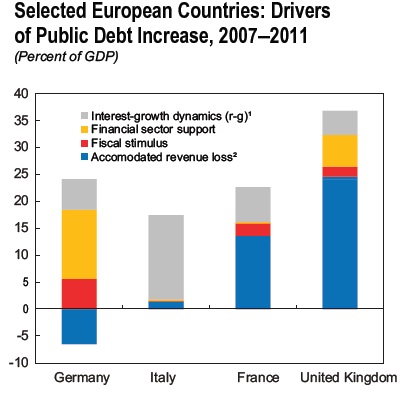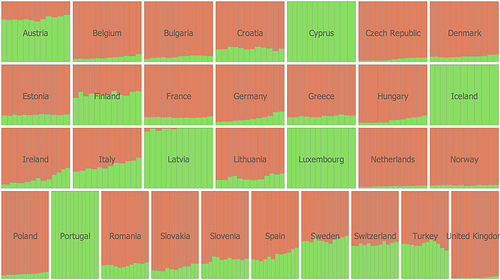One of the more persistent nuisances in British politics is the eagerness in which the government of the day launch populist attacks against the European Court of Human Rights when it rules against them. Whether it’s a Labour or a ConDem government, whenever a ruling goes against them, British sovereignty is endangered by faceless Strasburg Eurocrats and how dare they overrule parliament as the ultimate will of the people. Never mind that Britain has voluntarily chosen to be subjected to the court, or that it doesn’t do anything different from what the UK’s own courts do, i.e. examine government decisions to see if they were made in compliance with the law and if necessary condemn them. That’s an integral part of any true democracy, to have an independent judiciary which can protect the ordinary citizen from governmental abuse of power: parliament to make laws, the government to execute power and the courts to uphold the laws. This is neither new nor controversial, but because this is an European court it’s easier to whip up resentment against it.
Which, to be perfectly clear, is just a special case of the general political resentment against the independent judiciary both Tories and New Labour have had for decades. This was something of a bête noire for Sandra, who as both a trained lawyer and a socialist could get incredibly angry about the way the law was treated, especially by New Labour, busy creating a flood of mostly unenforcable new laws while ignoring existing laws and jurisprudence. She thought that a government so packed full of lawyers should know the limits of the law and what it could and couldn’t do and why it is dangerous for any government to ignore and disrespect it.
In the case of the European Court of Human Rights the damage populist outbursts against it don’t limit themselves to Britain, but far abroad. Though in the UK the ECHR is only mentioned in the context of British court cases, these are only a vanishingly small percentage of its workload; much more important is the role it plays in countries like Russia, countries where the domestic courts are often unable or unwilling to enforce domestic or European legislation both when it’s against the state’s interests. AS Oliver Bullough explains:
The ECtHR’s intray is, as Cameron said, bulging. There are 15,000 pending applications from Turkey, 13,000 from Italy, 12,000 from Romania and 10,000 from Ukraine. But it is Russia that provides the most. Some 40,000 cases from Russia were outstanding by the end of last year, which is more than a quarter of the total.
Russian courts have been reformed since the end of the Soviet Union, but there may as well not have been. Despite efforts to bring in jury trials, transparency and so on, some 98 percent of cases still end in a conviction. In some regions – such as Krasnodar in the south – if the state prosecutors open a case against you and take you to court, you will 100 percent of the time be found guilty.
As it happened, while the British press was fixating on the government’s failure to get Abu Qatada out of the country, these two rulings on Tuesday, April 17 were quietly demonstrating the full range of work that the court does to provide justice for Russian citizens let down by their own court system.
At one extreme, there was a finding in favour of a Chechen woman whose husband had been killed by Russian soldiers. At the other extreme, the court was protecting the rights of those same Russian soldiers against the Russian state. It is hard to imagine how a day’s caseload could be more indicative of the legal nihilism that Russia has sunk into or the importance of Strasbourg in opposing it. In both examples, Russian officials delayed, obfuscated and failed to do the duties they were supposed to do, until the ECtHR slapped them down.
Seen in this context, the concerns British politicans have about the court are revealed for the petty nonsense that they are, but their rhetoric does a lot of harm nonetheless:
The torrent of decisions has not gone un-noticed by top officials. A court decision last summer forcing Russia to give paternity leave to servicemen provoked Alexander Torshin, then acting speaker of the upper house of the Russian parliament, to propose a new law that would guarantee the supremacy of Russian courts over the ECtHR.
“I think that, with its new practices, the Strasbourg Court, departing from the bounds of the European Convention, has moved into the area of the state sovereignty of Russia, and is trying to dictate to the national lawmaker which legal acts it must adopt, which thus violates the principle of the superiority of the Constitution of the Russian Federation in the legal system of our state,” he wrote in an article in the government’s own newspaper Rossiiskaya Gazeta.
He then listed other countries that have had trouble with the court over the years – Germany, Britain, Switzerland and Austria – using their efforts to find a way to square their own legislation with the court as justification for his own bill.
Although the bill has not got anywhere since it was mooted in July, his article was a clear sign that criticism of the court in western countries where it does little work is amplified in Russia where its work is crucial.
In other words, Cameron and Clegg, like Brown and Blair before them, give cover for authoritarian regimes in Russia and elsewhere in Europe with their petty, party political posturing, potentially allowing one of the few ways in which such governments can be held to account by their own citizens to be neutered. For those of us on the left this should be an incredibly dangerous development, even if we’re often skeptical of the use the courts and the law are put through, as they’re still one of the few ways in which ordinary people can fight back agains the state and without them our own struggles will be that much harder.

